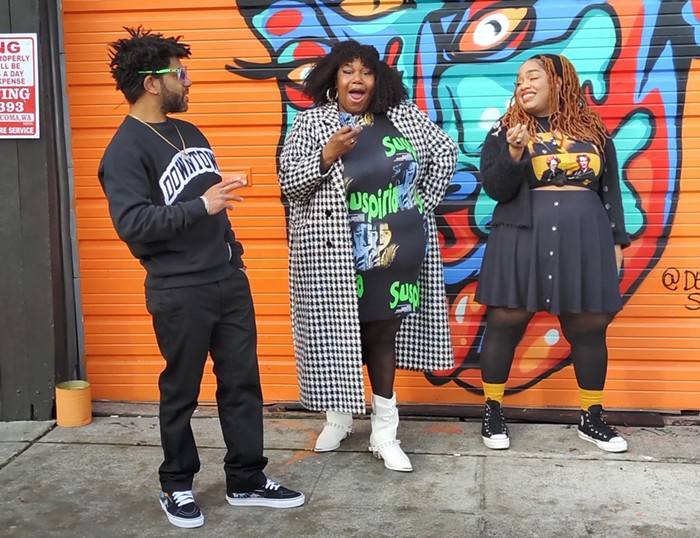It is 10:30 p.m. on a Sunday, and I am pointing the blue flame of a propane torch at a little glass piece fixed to the end of a water pipe. It takes about a minute for the glass nail to start to glow red-hot. That's when I turn the torch off and start my timer. After about 40 seconds, the red glow has faded and I drop a piece of hash about the size of a grain of rice onto the nail. I breathe in as the hash vaporizes and get a hit that pops with fruitiness and the epitome of fresh green flavor.
And with that airy, light hit, all the stress from my weekend job fades away as I sink into my couch.
Mentioning dabbing in the company of adults, even the pot-friendly twentysomethings I spend most of my time with, evokes laughs and mocking scorn: "Isn't that like the moonshine of weed?" "Why do you need to get THAT high?" "What's next, you're going drill a hole in your skull and get high through a cranial IV of THC?"
I usually respond by offering them a small dab of a top-shelf concentrate, and they are almost always convinced that dabs are far more interesting than they thought. Concentrates are as fine a local craft product as any award-winning Washington State wine or beer. Pot farmers are some of the most exacting gardeners in the world, and the processors making top-shelf concentrates are as precise and professional as any brewer or vintner. And all of their work happens in Washington, often grown and processed within Seattle itself.
Most concentrates used for dabs test from 65 to 99 percent THC, which make them astoundingly strong, between three and five times as strong as top-shelf cannabis flower. But think about these potency numbers through the lens of the alcohol industry and they seem less absurd. Whiskey is at least eight times stronger than an average beer, and can sometimes be sold as high as 60 percent alcohol, about 12 times stronger than beer. Meanwhile, consuming too much THC can't kill you, but alcohol can.
That fruity dab I did at the beginning of this story was a Pineapple Express hash made by Terpco. An earlier visit to Terpco's Sodo facility reminded me immediately of a craft brewery—the people who own the company are also the ones making the product, and every aspect of their business is built around the craft. They start with fresh, uncured bud and then freeze it, preserving all of the pot's flavorful terpene compounds. Then they process their weed using purely mechanical means, in either ice-water baths for their "ice wax" or pushed through filters on mechanical presses for their "rosins."
"Our techniques are all about making the terpiest dabs possible, and we firmly believe that using our solvent-free process does that," said Tyler Smith, co-owner of Terpco.
Not every great dab is solvent-free, though. Oleum Extracts nearly swept this year's DOPE Cup—the premier weed contest in Washington—with five different awards in the extract category. Oleum extracts their concentrates by using a blend of propane, butane, and other hydrocarbon gases, producing potent but still flavorful concentrates. Justin Marsh, spokesperson for Oleum, said their techniques allow an even greater concentration of flavor.
"It ends up with that very sweet, very nice flavor," Marsh said. "We've taken out all of the bad-tasting stuff like the plant's chlorophyll, the salts, the minerals."
X-Tracted Laboratories is another hydrocarbon processor making some of the finest dabs in the world out of their Sodo facility. I got my hands on some Super Lemon Haze from their Refine Seattle line of concentrates, and it packed the clearest, strongest punch of lemon flavor I have ever had in a weed.
Ryan Abernathy, the president of X-Tracted, has a long history in making extracts (he said he made his first extraction in 1994) and is widely respected for his concentrates.
"We love the smell of cannabis, we love the flavors of cannabis, and we want to preserve and enhance those profiles and even take it to a new level," Abernathy said.
One of the biggest problems facing the concentrate industry is the abundance of terrible extracts. If these three companies—Terpco, Oleum, and X-Tracted—are equivalent in their industry to top-tier craft breweries like Seattle's Cloudburst Brewing or Holy Mountain Brewing, then their bottom-shelf counterparts are akin to your neighbor's first batch of home-brewed beer. If your first IPA tasted like a dryer sheet and looked like pond scum, would you keep drinking beer? Probably not. So if your first experience with a dab tasted like shit and left you feeling too high and uncomfortable, seek out some top-shelf stuff, take only a pinch, and prepare to be blown away by the essence of cannabis.

















